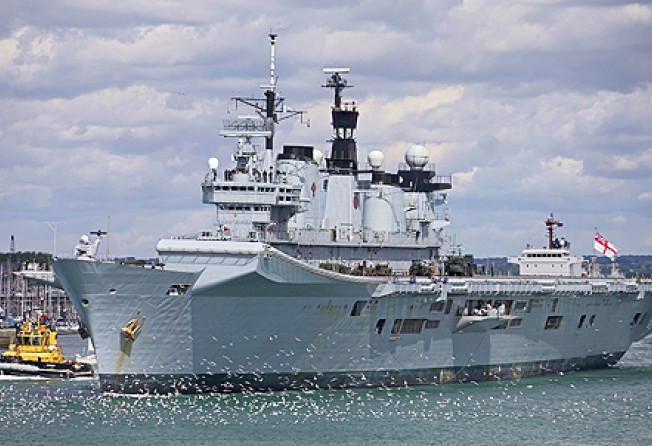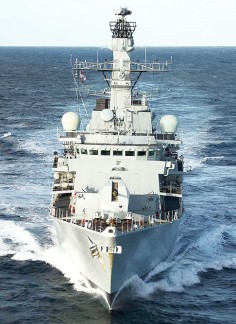Britain warns of legal action as warships head for Gibraltar
British warships head to Mediterranean as Gibraltar dispute heats up

Britain warned Spain yesterday it might take legal action to try to force Madrid to abandon tighter controls at the border with the contested British overseas territory of Gibraltar in what it called an "unprecedented" step against a European ally.
The warning coincided with the departure of a British warship for Gibraltar, played down by the British and Spanish governments as part of a long planned, routine exercise but which underscored heightened tensions over the territory.
A spokesman for Prime Minister David Cameron said the Spanish border checks, imposed after Gibraltar created an artificial reef which Spain said blocked its fishing vessels, were "disproportionate" and "politically motivated".
Tensions over the rocky outpost at the mouth of the Mediterranean to which Spain lays claim have turned into one of the worst disputes in years between the two European Union members.
"The prime minister is disappointed by the failure of the Spanish to remove the additional border checks this weekend and we are now considering what legal action is open to us," Cameron's spokesman said, arguing they breached EU law.
"This would be an unprecedented step," he added, saying that the British ambassador in Spain would relay Britain's message to Spanish officials later in the day.
Spain said it would not back down over the border controls which it said were a legal and proportionate step to prevent money laundering and smuggling of tobacco and other products from Gibraltar.

The territory, which has a population of 30,000 and relies on tourism, the gambling industry and offshore banking, has been a source of tension since Spain ceded it to Britain in the Treaty of Utrecht 300 years ago.
Spain's tougher checks at the 1.2km border have caused long delays for thousands of tourists and local people. Madrid also aired the idea of imposing a border crossing fee and of banning planes using its airspace to reach Gibraltar.
A Spanish foreign ministry spokeswoman yesterday restated her country's position that it was considering what international forum it could use to press its claim to Gibraltar.
A diplomatic source in Spain said on Sunday that Madrid might take its case to the United Nations, while a report in El Pais newspaper said it would seek support from Argentina, which disputes Britain's sovereignty of the Falkland Islands in the South Atlantic Ocean.
Gibraltarians were granted full British citizenship in 1981 and a referendum in 2002 backed Britain's rule, with 98 per cent of voters rejecting the idea of shared sovereignty with Spain.
Spain's Prime Minister Mariano Rajoy spoke with Cameron about the dispute last week and both sides expressed a desire to calm the row, but neither backed down. Both politicians now run the risk of losing face in front of their domestic audiences.
In London, Boris Johnson, the city's outspoken mayor, waded into the debate, telling Madrid to take its "hands off our Rock", saying he hoped the planned arrival of British warships in Gibraltar was not a coincidence.
Thousands of Royal Navy personnel set sail yesterday for a training deployment in the Mediterranean amid the diplomatic tensions between the UK and Spain.
The helicopter carrier HMS Illustrious left Portsmouth naval base and will join the navy flagship HMS Bulwark, which sailed from Devonport for the Cougar 13 operation. Also sailing today will be a frigate, HMS Westminster, which will visit Gibraltar en route.
It evoked the 16th century naval rivalry between the two countries in which the English repelled an attempt by the Spanish armada to try to invade England in 1588 and the Spanish defeated an English "counter armada" the following year.
A spokesman for the European Commission, Jonathan Todd, confirmed yesterday that a team of commission officials would travel to Gibraltar in September.
"They will be there to verify compliance with EU rules on frontier controls," he said, adding it wasn't clear yet how many EU officials would be involved.
Additional reporting by The Guardian